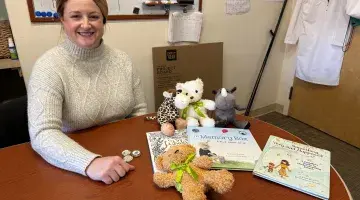The Importance of Talking About End-of-Life Care
Author

South Shore Health
South Shore Health and Linden Ponds are hosting two free community screenings of the documentary “Being Mortal” on October 26 and November 14. We sat down with Peggy O’Neil Files, manager of Pastoral Care Services at South Shore Health to find out why it is so important for people to talk with their family about quality of life at the end of life.
Q: As a hospital-based chaplain, what do you see in your work that makes you feel it is so important to talk about how we want to die?
I often see families in crisis struggling when a family member is unable to speak for themselves and a health care proxy or other family member is called on to make important health care decisions. It’s very sad when the proxy or family member tells me they have no idea what their loved one would want. You feel for that person who is experiencing such helplessness and anxiety. The lack of clear direction around health care decisions can cause family tension and division, even in the most loving families. That’s why it’s so important for all of us to have that conversation with our loved ones.
Q: What are some things that prevent people from talking with their physicians about how they want to die?
No one likes talking about death, but there is also fear. Patients sometimes worry if they set limitations on what should and shouldn’t be done when they are unable to make their wishes known, that medical treatment and compassionate care will stop, which is not the case. Other factors are present, such as thinking that physicians will only talk about the clinical aspects of dying, and not about spiritual or cultural considerations. Patients also sometimes assume physicians don’t have the time to have this conversation. And sometimes it is just procrastination.
Q: Do physicians typically initiate these conversations with their patients?
Physicians are human too and are not always comfortable bringing up the subject of how their patients want to die. They are trained to help people get and stay healthy. But many doctors are now being trained to start this conversation and continue talking about it, even with their healthy patients.
Q: How do you suggest families start a conversation?
The best time to talk about this subject is when you are still healthy. A number of resources exist to help families begin this conversation and think through what each family member would want at the end of their lives. A great start is Dr. Gawande’s book “Being Mortal.” Online tools and community seminars through councils on aging are also available. Keep in mind; this is an ongoing conversation for people. You might feel differently now than you will 10 years from now. The point is that no one is going to know how you feel or what you are thinking unless you tell them.
Q: Why did you work to bring Dr. Gawande’s film to the South Shore and why would you encourage people to attend?
I’ve been passionate about this subject for a long time, and this was an opportunity to bring this amazing documentary to a larger audience on the South Shore. I’ve had personal experience with having these conversations with my own parents, so I know how hard it is. But honestly, knowing what my parents wanted at the end was their final gift to me. It allowed me to just be present as their daughter, to honor and respect them. Many people think that having this conversation means giving up hope. But really, we are holding hope in one hand and circumstances in the other. It’s about letting people know what is most important to each of us in the end.
Learn more about Primary Care at South Shore Health.
Author

South Shore Health






